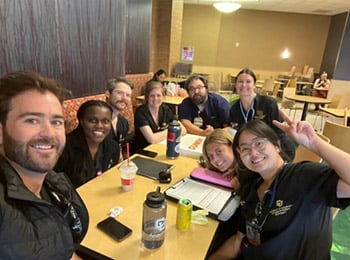As a young man, Sam Wellman felt lost. While his friends were pursuing their dreams in college, Sam succumbed to ennui and despair. Without purpose or direction, he drank and drank. Until one day at the bottom of a shot glass, he realized he appreciated and admired the people helping him recover. They were nurses.
“That was a huge influence on why I wanted to become a nurse,” says Wellman, Bachelor of Science in Nursing (BSN) candidate at the University of Colorado College of Nursing at the Anschutz Medical Campus. “My own journey has been difficult for sure, and I've learned how to be resilient, how to communicate, how to show up authentically, how to love, how to accept love, and how to prioritize balance. These are things that the College of Nursing really emphasizes, and I commend them on that.”
The recovering alcoholic has been sober since April 2020. He’s making up for lost time by participating in the University of Colorado Accelerated Nursing program (UCAN) at CU Nursing; a full-time pathway that will help him earn a BS in Nursing in 12 months.
Wellman graduated from Colorado State University in 2019 with a bachelor of arts and sciences in psychology and sociology. Then, he moved to Utah where he lived with his parents and found work in the field of substance abuse treatment. He later got a job with a nonprofit. While he struggled for a few years to get started, he says his parents were patient and supportive.
“What a gift. I'm incredibly grateful to them. They've enabled me to strive for goals that I never thought could be possible, like becoming a nurse. It sounds very simple in layman's terms, but to me, the opportunity to get a degree that enables me to work in medicine is a really profound thing,” he says.
During that time, Wellman learned how to balance life and take care of himself. Those skills ended up being a solid foundation for matriculating to CU Nursing.
The Four Key Pillars
Wellman learned in addiction recovery that there are four key pillars to selfcare, according to the Substance Abuse and Mental Health Services Administration. Good physical health, a stable home, having purpose and meaning, and community service. Wellman uses those pillars daily to manage the challenges of college and life. He’s especially dedicated to serving others. He volunteers for several organizations, including Alcoholics Anonymous and the 12-Step Recreation Association that organizes sports, activities, and events for people in substance abuse recovery.
“I try my best to give my free time to the service of others because that's what helps me stay sane and sober and healthy,” says Wellman.
The Pioneer in Nursing

UCAN students become fast friends during the program. |
When Wellman was considering where he wanted to go to nursing school, he said the choice was obvious. The UCAN program at CU Nursing is nationally ranked and students get to learn at the Legacy Innovation Campus and the Anschutz Medical Campus. After checking out other schools, he found there was no place quite like the University of Colorado.
“These are ambitious learners and people eager to contribute to academia. There is also a cool level of access to actively working medical professionals. That's incredible that we get to be in such close proximity to the work, right? We're doing this to heal and to help and so, to be that close to people who are healing and helping is an incredible thing,” says Wellman.
“The true gift of being here is that the educators here are in the work - they're not retired nurses. I had a professor in pathophysiology who was a cardiac nurse practitioner. So, we’re learning based upon real clinical experiences. Also, more than half of our clinical hours are spent at the most premier hospital in the state. I am just overwhelmed with gratitude that I get to be a part of it.”
A+ Lessons
One class this year made a big impact on the 26-year-old. The geriatric nursing course taught by Professor Kelly Henrichs requires students to work clinical hours in assisted living communities to get to know the residents. Sam says the experience made him rethink what it means to be old and provide geriatric care.
“They're not different people. There is both actual and intellectual diversity in this population. There's love, happiness, and excitement, and they’re dynamic and versatile and useful people. The class completely changes the paradigm of what we really know about older adults,” says Wellman.
There have been several paradigms in Wellman’s life. With a clear-eyed view, he’s created possibilities to help and heal others while simultaneously taking care of himself.
“I'm actually really grateful for my struggles in life because they've carved out a purpose for me. I really feel like what keeps me alive and healthy and happy today is service of others,” he says.



